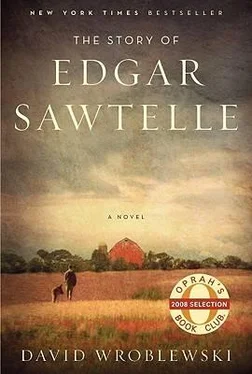He sat in the sun and watched Gus, thick-legged and clumsy, pin a grasshopper to the ground, mouth it, then shake his head with disgust and lick his chops. He’d begun smothering the hopper with the side of his neck when he suddenly noticed Edgar’s grandfather looking on, heels set in the dirt driveway, toes pointed skyward. The pup bucked in mock surprise, as if he’d never seen this man before. He scrambled forward to investigate, twice going tail over teakettle as he closed the gap.
It was, John Sawtelle thought, a lovely little place.
Explaining Gus to his wife was going to be the least of his worries.
IN FACT, IT DIDN’T TAKE LONG for the fuss to die down. When he wanted to, Edgar’s grandfather could radiate a charming enthusiasm, one of the reasons Mary had been attracted to him in the first place. He could tell a good story about the way things were going to be. Besides, they had been living in her parents’ house for over a year and she was as eager as he to get out on her own. They completed the purchase of the land by mail and telegram.
This the boy Edgar would come to know because his parents kept their most important documents in an ammunition box at the back of their bedroom closet. The box was military gray, with a big clasp on the side, and it was metal, and therefore mouseproof. When they weren’t around he’d sneak it out and dig through the contents. Their birth certificates were in there, along with a marriage certificate and the deed and history of ownership of their land. But the telegram was what interested him most-a thick, yellowing sheet of paper with a Western Union legend across the top, its message consisting of just six words, glued to the backing in strips: OFFER ACCEPTED SEE ADAMSKI RE PAPERS. Adamski was Mr. Schultz’s lawyer; his signature appeared on several documents in the box. The glue holding those words to the telegram had dried over the years, and each time Edgar snuck it out, another word dropped off. The first to go was PAPERS, then RE, then SEE. Eventually Edgar stopped taking the telegram out at all, fearing that when ACCEPTED fluttered into his lap, his family’s claim to the land would be reversed.
He didn’t know what to do with the liberated words. It seemed wrong to throw them away, so he dropped them into the ammo box and hoped no one would notice.
WHAT LITTLE THEY KNEW about Schultz came from living in the buildings he’d made. For instance, because the Sawtelles had done a lot of remodeling, they knew that Schultz worked without levels or squares, and that he didn’t know the old carpenter’s three-four-five rule for squaring corners. They knew that when he cut lumber he cut it once, making do with shims and extra nails if it was too short, and if it was too long, wedging it in at an angle. They knew he was thrifty because he filled the basement walls with rocks to save on the cost of cement, and every spring, water seeped through the cracks until the basement flooded ankle-deep. And this, Edgar’s father said, was how they knew Schultz had never poured a basement before.
They also knew Schultz admired economy-had to admire it to make a life in the woods-because the house he built was a miniature version of the barn, all its dimensions divided by three. To see the similarity, it was best to stand in the south field, near the birch grove with the small white cross at its base. With a little imagination, subtracting out the changes the Sawtelles had made-the expanded kitchen, the extra bedroom, the back porch that ran the length of the west side-you’d notice that the house had the same steep gambrel roof that shed the snow so well in the winter, and that the windows were cut into the house just where the Dutch doors appeared at the end of the barn. The peak of the roof even overhung the driveway like a little hay hood, charming but useless. The buildings looked squat and friendly and plain, like a cow and her calf lying at pasture. Edgar liked looking back at their yard; that was the view Schultz would have seen each day as he worked in the field picking rocks, pulling stumps, gathering his herd for the night.
Innumerable questions couldn’t be answered by the facts alone. Was there a dog to herd the cows? That would have been the first dog that ever called the place home, and Edgar would have liked to know its name. What did Schultz do at night without television or radio? Did he teach his dog to blow out candles? Did he pepper his morning eggs with gunpowder, like the voyageurs? Did he raise chickens and ducks? Did he sit up nights with a gun on his lap to shoot foxes? In the middle of winter, did he run howling down the rough track toward town, drunk and bored and driven out of his mind by the endless harmonica chord the wind played through the window sash? A photograph of Schultz was too much to hope for, but the boy, ever inward, imagined him stepping out of the woods as if no time had passed, ready to give farming one last try-a compact, solemn man with a handlebar mustache, thick eyebrows, and sad brown eyes. His gait would swing roundly from so many hours spent astride the ponies and he’d have a certain grace about him. When he stopped to consider something, he’d rest his hands on his hips and kick a foot out on its heel and he’d whistle.
More evidence of Schultz: opening a wall to replace a rotted-out window, they found handwriting on a timber, in pencil:
25 1/4 + 3 1/4 = 28 1/2
On another beam, a scribbled list:
lard
flour
tar 5 gal
matches
coffee
2 lb nails
Edgar was shocked to find words inside the walls of his house, scrawled by a man no one had ever seen. It made him want to peel open every wall, see what might be written along the roofline, under the stairs, above the doors. In time, by thought alone, Edgar constructed an image of Schultz so detailed he needn’t even squint his eyes to call it up. Most important of all, he understood why Schultz had so mysteriously abandoned the farm: he’d grown lonely. After the fourth winter, Schultz couldn’t stand it anymore, alone with the ponies and the cows and no one to talk to, no one to see what he had done or listen to what had happened-no one to witness his life at all. In Schultz’s time, as in Edgar’s, no neighbors lived within sight. The nights must have been eerie.
And so Schultz moved away, maybe south to Milwaukee or west to St. Paul, hoping to find a wife to return with him, help clear the rest of the land, start a family. Yet something kept him away. Perhaps his bride abhorred farm life. Perhaps someone fell sick. Impossible to know any of it, yet Edgar felt sure Schultz had accepted his grandfather’s offer with misgivings. And that, he imagined, was the real reason the words kept falling off the telegram.
Of course, there was no reason to worry, and Edgar knew that, too. All that had happened forty years before he was born. His grandfather and grandmother moved to the farm without incident, and by Edgar’s time it had been the Sawtelle place for as long as anyone could remember. John Sawtelle got work at the veneer mill in town and rented out the fields Schultz had cleared. Whenever he came across a dog he admired, he made a point to get down and look it in the eye. Sometimes he cut a deal with the owner. He converted the giant barn into a kennel, and there Edgar’s grandfather honed his gift for breeding dogs, dogs so unlike the shepherds and hounds and retrievers and sled dogs he used as foundation stock they became known simply as Sawtelle dogs.
And John and Mary Sawtelle raised two boys as different from one another as night and day. One son stayed on the land after Edgar’s grandfather retired to town a widower, and the other son left, they thought, for good.
The one that stayed was Edgar’s father, Gar Sawtelle.
HIS PARENTS MARRIED LATE in life. Gar was over thirty, Trudy, a few years younger, and the story of how they met changed depending on whom Edgar asked and who was within earshot.
Читать дальше
Конец ознакомительного отрывка
Купить книгу












